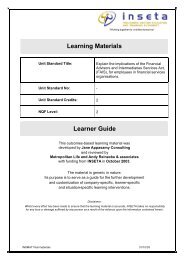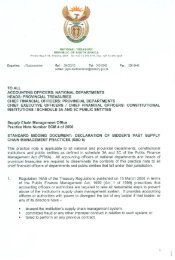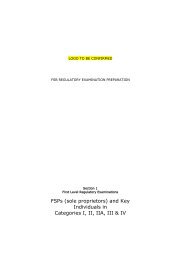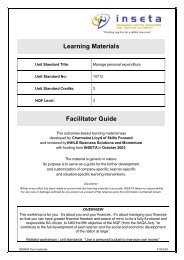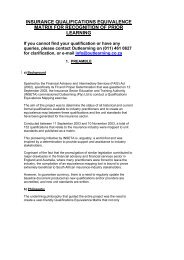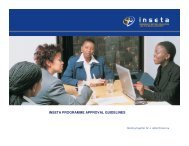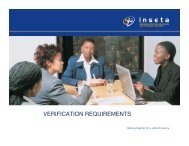SSP Brochure:Layout 1 - INSETA
SSP Brochure:Layout 1 - INSETA
SSP Brochure:Layout 1 - INSETA
Create successful ePaper yourself
Turn your PDF publications into a flip-book with our unique Google optimized e-Paper software.
5 SMALL BUSINESS AND ENTREPRENEURIAL OPPORTUNITIES AND OTHERNSDS PRIORITIES5.1 IntroductionThis chapter deals with a number of focal areas of the National Skills Development Strategy (NSDS) to which the SETAs will be attendingin the period covered by this <strong>SSP</strong>. These areas include small business and entrepreneurial opportunities, support to small levy paying andnon-levy paying firms, adult basic education and training, the promotion of national standards of good practice and stakeholder capacitybuilding.5.2 Small business and entrepreneurial opportunitiesThe NSDS for 2005 to 2010 places strong emphasis on small business development and the cultivation of skills necessary to start andmaintain new businesses. SETAs are specifically required to develop skills development strategies in support of new small businesses andtherefore this <strong>SSP</strong> contains an analysis of the possible small business opportunities that may exist in the sector.Small business opportunities were identified by the professional and industry bodies that participated in the <strong>SSP</strong> development process in2005 and 2007. Table 5-1 below summarises small business opportunities in specific subsectors and the relevant occupations, as well asthe skills, training and other requirements needed in order to benefit from these opportunities. Because the insurance industry is complexand highly regulated, the respondents 62 believed that entrepreneurs intending to start SMMEs in the sector will require advanced technicalqualifications and industry-related practical skills to succeed in new business ventures. In certain of the subsectors, such as reinsurance andcollective investments, considerable capital is needed to enter the market. 63 The area that is most suitable for the training and developmentof new entrants to the labour market (i.e. unemployed young people) is the intermediary subsector.Table 5.1 Summary of small business development opportunities in the insurance industrySmall business opportunity Subsector Skills and training needs Other requirementsFranchises of insuranceservices (branch offices oflife offices are franchisedand operated as separatebusinesses)Long term • Business and financial management skills• Technical insurance industry knowledge and practical experience (notmerely textbook knowledge)• People management skills• Marketing and selling skills• Customer service skills• IT and computer skills• Start-up capital• Office infrastructure• Business systems• Skilled human resourcesOutsourcing of specialisedunderwriting in short-termand reinsurance industryIntermediaries and brokersto serve the emergingmarketAdministration serviceswith specialised back officestaff with relevant industryexperience (“in”-sourcingof specialisedadministration services)Short termReinsuranceShort termLong termMedicalinsuranceShort termLong termIntermediariesCollectiveinvestmentsMedicalinsurance• Technical insurance industry knowledge and practical experience• Specialised risk assessment skills in relation to the activity or entity tobe insured• Risk management skills• Business and financial management skills• People management skills• IT and computer skills• Business and financial management skills• Technical insurance industry knowledge and practical experience• Entrepreneurial skills• People management skills• Marketing, selling and customer service skills• Language and communication skills to service emerging market• Understanding of needs of emerging market and cultural barriers toinsurance products• General office and practice management skills• Relevant technical insurance industry knowledge and practicalexperience (not merely textbook knowledge)• Customer management skills• Accounting, bookkeeping and financial record-keeping skills• Knowledge of tax laws• Knowledge of relevant legislation and industry practice codes• Entrepreneurial skills• Business and financial management skills• IT and computer skills• Start-up capital• Office infrastructure• Business systems• Skilled human resources• Start-up capital• Office infrastructure• Business systems• Skilled human resources• Start-up capital• Business systems• Skilled human resources62 Professional and industry bodies who participated in the 2005 update process.63 According to the South African Reinsurance Offices Association, a new reinsurer will require at least R80 million in start-up capital, and the Association of Collective Investmentsestimates that a potential new unit trust manager will require at least R50 million in start-up investment funds.<strong>INSETA</strong> Sector Skills Plan - page 40






